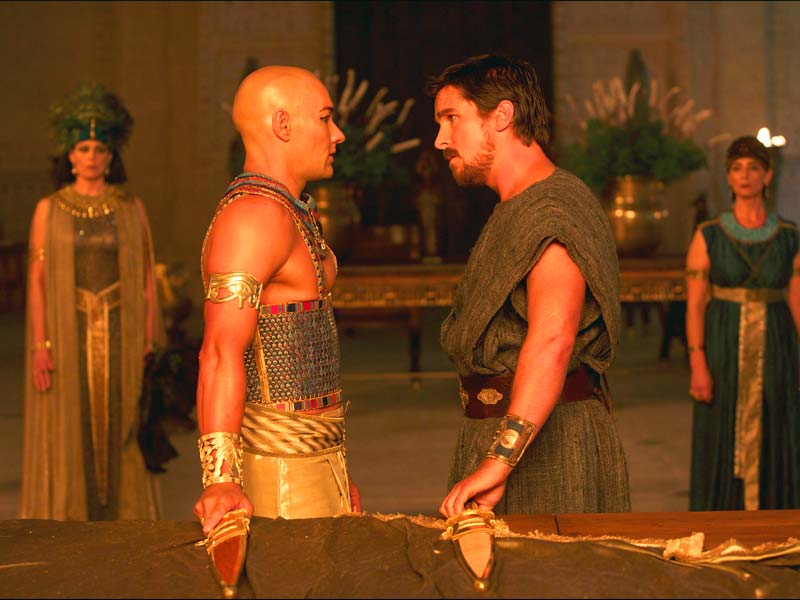Exodus: Gods and Kings
Director: Ridley Scott
Cast: Christian Bale, Ben Kingsley, Joel Edgerton
Rating: 2.5/5
Ridley Scott’s Exodus: God and Kings is a story set in ancient Egypt where Moses is English, Ramses is Australian and God is a very angry schoolboy with a high falutin British accent.
This Biblical retelling has been in news ever since it was announced and mostly not for the right reason. The chief gripe was the fact that white actors were playing the leads which were all supposed to be brown.
Well, Scott solved the problem by investing in industrial strength bronzer and offering the explanation of how only famous white names work on BO, especially in a multi-million dollar epic like this one.
So, we get to see highly bronzed Moses (Christian Bale) and pharaoh-in-waiting Ramses (Joel Edgerton) as friends in Egypt. Pharaoh Seti (John Turturro) knows his adopted son Moses is better equipped to lead his country but blood wins in the end. (Spoilers ahead)
Ramses knows his father prefers Moses and is deeply insecure. His conniving mother Tuya (Sigourney Weaver) doesn’t help either.
In the meanwhile Moses learns from Nun (Ben Kingsley) that he is actually Hebrew, a race Egyptians have enslaved for centuries. Word gets back to Ramses and he is banished from the kingdom. Moses himself finds it hard to come to terms with this truth. He wanders in desert for years and finally settles in a village with his wife and son. After a traumatic injury, he comes face-to-face with god who calls upon him to free his race and lead them to the promised land of Canaan (Israel).
Up against the stubborn and conceited Ramses once again, Moses finds himself failing. That’s when god takes it upon himself to lend him a helping hand. More fire and brimstone than the kind deity we know of today, god unleashes the plagues on Egypt one after another.
Afraid and angry, Ramses allows Hebrews to leave for Canaan but then follows with his army. His aim is not to recapture his erstwhile slaves but to finish them off. What could have been the perfect climax – the parting of Red Sea — is dragged along by Scott till the writing of the Ten Commandments, and an old and bedraggled Moses leading his people to Canaan.
It is this weak ending which is the most disappointing. After an epic, you want to leave the theatre still reeling from the scale and imagery of the climax. Instead, you carry the image of a very old Bale chugging along in a cart.
The film, however, does have its CGI-fuelled moments. The battle in the beginning of the film and the parting of the Red Sea are some of the most amazing effects. Scott reserves the best to portray the plagues – from waters of Nile turning red to attack of locusts – which are shown in vivid detail.
Scott believes in bigger-is-better model of filmmaking and goes large-scale in Exodus as well. While visually it is exciting, the film has no heart. We hear of how Hebrews are tortured and end up as spent corpses, we see the excesses of Egyptians but none of that touches us. Never in the film does it get personal. We don’t understand the intricacies and depth of Ramses and Moses’ friendship either.
The filmmaker does not up the expectations either or understand the whys and hows behind the fantastical elements; he sticks to the familiar and just makes it CGI-perfect.
The film belongs to its two leads. Bale brings his usual intensity to the role and plays Moses as a man who often is not sure of the path he is taking. He is shown torn by his various choices and doubts his ‘prophetic’ decisions. Edgerton’s pharaoh is suitably vain yet stays away from melodrama. As god’s wrath begins, he goes from the typical bad guy to an anti-hero to a distressed father. Strong actors such as Ben Kingsley, Aaron Paul and Weaver are wasted in their short roles.

